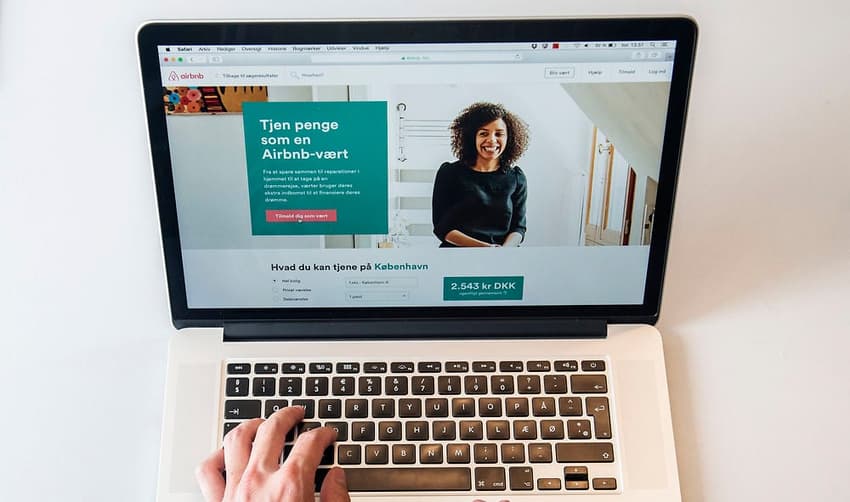In world first, AirBnB to report income directly to Danish authorities

Danish tax officials and the international home rental site Airbnb have announced an agreement that will ensure that short-term rental income in Denmark will be automatically reported to the authorities.
According to the Tax Ministry, Denmark is “undoubtedly” the first country to get Airbnb to agree to such an arrangement.
The agreement came just days after parliament agreed to set a cap on how many days Danish homeowners can rent out their homes through the service, as well as how much money can be earned tax-free through Airbnb before it has to be reported to Skat, the national tax authority.
Tax Minister Karsten Lauritzen said the agreement is essential to ensure that Airbnb ‘hosts’ pay the right amount of tax.
“I’m not always a happy tax minister, but I am today,” he said on Thursday. “This is how we will get the sharing economy to grow while also ensuring that taxes are paid."
Lauritzen announced the arrangement alongside Airbnb’s Patrick Robinson, the company’s director of public policy in Europe, the Middle East and Africa. Robinson said that Denmark was a good place for Airbnb to start the automatic reporting.
“Denmark is a good place to try this. Denmark has a strong welfare society and the Danes are open to new things,” Robinson said.
As part of the political agreement that proceeded the Airbnb deal, Airbnb hosts were given increased tax-free allowances on their rental income. For permanent residences, the amount homeowners can earn before paying tax will be increased from 24,000 to 28,000 kroner. For those renting out summer homes, the tax-free allowance will be raised to 40,000 kroner from the previous 21,900 kroner. When the rental income exceeds those amounts, it will be taxed by Skat.

A graphic from the Tax Ministry showing how much tax-free income can be earned through short-term rentals.
The amount of days that one can rent out their home will be capped at 70 per year.
Airbnb is expected to build a digital solution that can be integrated into its online platform. All rental income in Denmark will then be sent digitally to Skat to ensure the proper taxes are paid.
NOTE: This article was updated on May 18 at 9.10pm to clarify the different levels of tax-free allowance.
Comments
See Also
According to the Tax Ministry, Denmark is “undoubtedly” the first country to get Airbnb to agree to such an arrangement.
The agreement came just days after parliament agreed to set a cap on how many days Danish homeowners can rent out their homes through the service, as well as how much money can be earned tax-free through Airbnb before it has to be reported to Skat, the national tax authority.
Tax Minister Karsten Lauritzen said the agreement is essential to ensure that Airbnb ‘hosts’ pay the right amount of tax.
“I’m not always a happy tax minister, but I am today,” he said on Thursday. “This is how we will get the sharing economy to grow while also ensuring that taxes are paid."
Lauritzen announced the arrangement alongside Airbnb’s Patrick Robinson, the company’s director of public policy in Europe, the Middle East and Africa. Robinson said that Denmark was a good place for Airbnb to start the automatic reporting.
“Denmark is a good place to try this. Denmark has a strong welfare society and the Danes are open to new things,” Robinson said.
As part of the political agreement that proceeded the Airbnb deal, Airbnb hosts were given increased tax-free allowances on their rental income. For permanent residences, the amount homeowners can earn before paying tax will be increased from 24,000 to 28,000 kroner. For those renting out summer homes, the tax-free allowance will be raised to 40,000 kroner from the previous 21,900 kroner. When the rental income exceeds those amounts, it will be taxed by Skat.

A graphic from the Tax Ministry showing how much tax-free income can be earned through short-term rentals.
The amount of days that one can rent out their home will be capped at 70 per year.
Airbnb is expected to build a digital solution that can be integrated into its online platform. All rental income in Denmark will then be sent digitally to Skat to ensure the proper taxes are paid.
NOTE: This article was updated on May 18 at 9.10pm to clarify the different levels of tax-free allowance.
Join the conversation in our comments section below. Share your own views and experience and if you have a question or suggestion for our journalists then email us at [email protected].
Please keep comments civil, constructive and on topic – and make sure to read our terms of use before getting involved.
Please log in here to leave a comment.